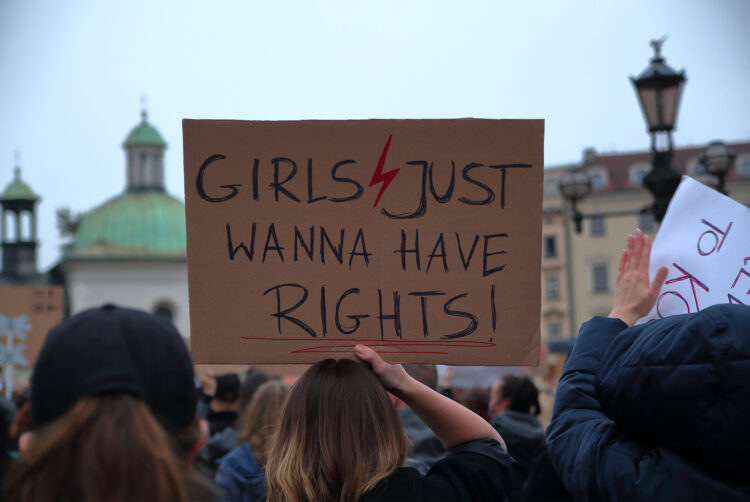Media companies’ abortion travel pledges are not enough

Opinion
Media companies can and should go further to speak out against the Dobbs decision and signal to women that their cries for help are being heard.
The media industry’s response to the Supreme Court overturning Roe v. Wade has been insufficient.
More than half (26) of states have moved or are expected to move to limit or otherwise outlaw abortion following the Dobbs ruling, according to abortion rights research organization the Guttmacher Institute. Many of those states, such as Texas, Florida, and Georgia, are home to some of the country’s largest media businesses.
Numerous private companies with media interests signaled they believe the decision drafted by Justice Samuel Alito is heinous, and have acted to clarify or commit to covering travel costs related to receiving abortions. They include Apple, BuzzFeed, Comcast, Condé Nast, Disney, Google, Meta, Microsoft, Netflix, Paramount, Reddit, Sony, Warner Bros. Discovery, and Vox Media, among others.
Five of the world’s largest media agency holding companies — Dentsu, IPG, Omnicom Group, Publicis Groupe, and WPP — have pledged to provide travel expenses or reimbursements for women who must now go out of state to receive an abortion. Havas has yet to update its policies but has signaled it may do so soon.
At the surface level, this appears to be a noble stand, worthy of praise. Given business interests’ significant sway in US governance, the private sector will indeed need to play a large role in maintaining equal rights and protection for women throughout the country, and providing the means to access reproductive health services is an important step.
However, the reality is that such a policy opens a can of worms.
In certain states such as Texas, which has enacted a “bounty” law, private citizens can sue others they suspect of receiving an abortion procedure and those that aid women in doing so. Companies will be tested in their willingness to cover potential legal costs that may incur.
They must also take steps to ensure that women are able to report the need for out-of-state travel expenses in ways that respect their privacy given the high degree of risk involved.
The need for employers to provide additional travel money for its women highlights both the lack of free healthcare and the lack of equal pay for women in America. If women were paid more and could afford to travel to liberal states, and if healthcare did not incur such high personal costs, much of this conversation would be moot.
It is understandable that companies want to respond to a truly horrific situation with support for their employees. Doing nothing would be an abdication of responsibility as an employer. But media companies can and should go further to speak out and signal to women that their cries for help are being heard.
Google appears to be leading the way — the world’s biggest ad seller is offering its employees the ability to relocate without justification. Women would therefore be free to retain their employment and move to a state that respects their bodily autonomy without needing to disclose to the company their reason for doing so.
Other companies should follow suit where possible, keeping in mind that not all firms have as many offices throughout the US or the ability to allow staff to move as easily.
They should consider moving business operations out of states that institute abortion bans altogether, creating economic disincentives to state legislatures for infringing upon abortion rights while also sending clear signals to women that executive leadership will not stand for such policy change.
Big companies should back these types of actions up with their wallets. OpenSecrets, a non-profit organization that tracks political donations, shows that WPP Group’s political action committees, owners, and employees have donated nearly $330,000 to Republicans this year, including anti-abortion politicians like John Thune and Chuck Grassley. This is unacceptable and must be amended going forward if the holding company wants its pledges of support to be taken seriously. Same goes for any organization that bankrolls anti-abortion politicians.
Media and advertising firms both have the responsibility to actively campaign on behalf of human rights. Publishers and cable news programs should be following in the BBC’s standard of using terms such as “anti-abortion” rather than “pro-life” to refer to activist groups, the latter of which is considered partisan language. Restricting advertising from platforms that advocate on behalf of anti-abortion policy and ideology should also be highly considered.
Brands should be sure to continue funding good, trusted journalism through advertising, rather than pulling their ads for risk of appearing to weigh in on a controversial topic. Supporting quality journalism is as important as ever, especially as misinformation regarding abortion is already spreading across social media in the wake of the decision. As highlighted in The Media Leader recently, sites like Brands4News.org provide open-source resources for brands to do just that.
Brands and media companies should be prepared, assuming the Supreme Court – as signaled by Clarence Thomas in his concurrence – takes up cases to overturn the right to contraception in Griswold (1965) and the right to gay marriage in Obergefell (2015), to take further action. It would be antithetical to brands’ ubiquitous rainbow logos (including at The Media Leader) if they did not put their money where their mouth is.
Given the overwhelming popularity and support for abortion access, media companies and brands risk little by sticking up for abortion rights. The industry owes it to the Americans it targets with entertainment and advertising at all times of the day to do more.
Jack Benjamin is US reporter for The Media Leader
[email protected]




